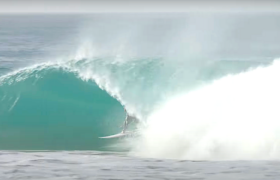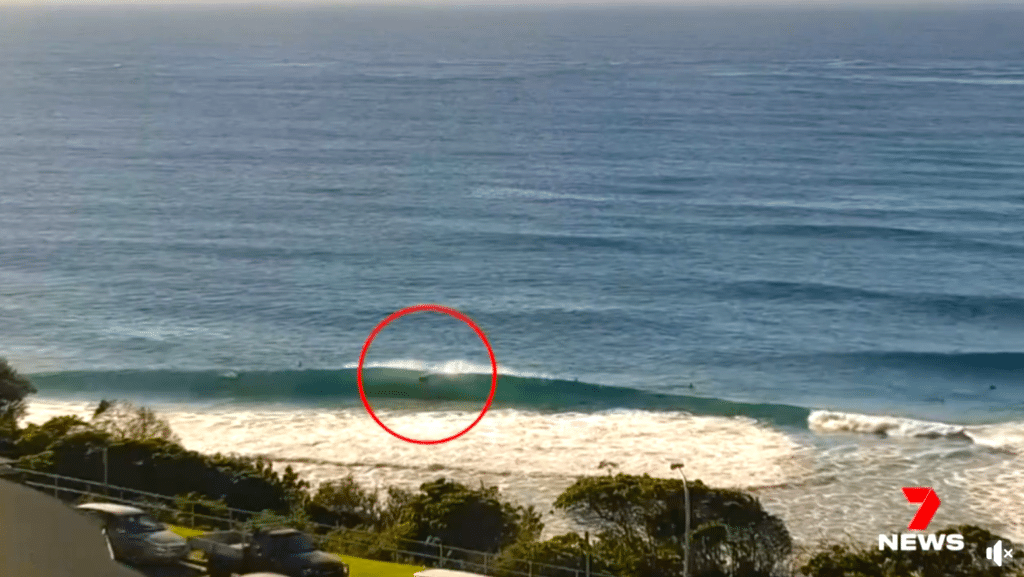And surfs world's most hotly policed and expensive to surf lefthander!
The last time eighties supermodel Cindy Crawford appeared on these pages it was as a surf pupil for the Tahitian heartthrob and Surf Ranch king Raimana Van Bastolaer, whom she subsequently described as “human viagra”.
“He’s the Big Blue Pill,” wrote Cindy Crawford. “ He can get anyone up! Even me!”
An icon of the fashion world, Cindy Crawford became one of the most recognizable faces in fashion, known for her trademark beauty mark above her lip. Her career peaked in 1987 when she appeared alongside the other OG supermods Christy Turlington, Linda Evangalista and Naomi Campbell on British Vogue.
Now, as if to cement those surf bona fides first established under Raimana’s powerful hands in Lemoore, Cindy Crawford has appeared in a photo shoot at the glamorous resort that fronts and owns the rights to Occy’s Left on the Indonesia island of Sumba.
And, not only is she enjoying the hotly policed left, Cindy Crawford even allowed surf photo legend Jason Childs to grab a couple of snaps as she posed in front of a pack of Sumba’s famous wild horses.
View this post on Instagram
Do you remember when Nihi, formerly Nihiwatu, was voted the best hotel in the world?
For twelve thousand dollars a night, you can rent a five-bedroom estate while a “starter villa” is $US1500 a night.
If you want to actually surf the left out the front, you have to peel off around $US150 per surf, which includes local and resort taxes, with a maximum of “one surf slot per villa” and a total complement in the lineup of twelve surfers.
Claude and Petra Graves set up Nihiwatu in 2000 before selling to American entrepreneur Chris Burch and South African hotelier James McBride in 2012.
After renovations last spring, Nihiwatu was visited by Travel + Leisure magazine‘s Peter Jon Lindberg, who wrote:
“I spent my week in Sumba in a state of suspended bliss, orbiting among infinity pools, natural mud baths, waterfall-fed swimming holes, glowing valleys full of rice paddies, misty mountaintop villages straight out of Tolkien, and a beach that looked as if it were airbrushed on the side of a van.
“That beach is spectacular, with or without the left-hand break, and one can easily see why the Graveses pitched their tent here. It can’t have changed much in the 27 years since: every morning I’d walk the mile and a half to the end, and every morning mine were the only footprints.
“Nihiwatu’s redesign—by the Bali firm Habitat 5—finds a winning balance between refined and raw. Guest villas allude to traditional Sumbanese homes, with steeply pitched thatched roofs and massive kasambi tree trunks for support columns. Sumbanese ikat tapestries and black-and-white photos of local villagers hang on ocher stone walls. Wide-angle windows overlook lush gardens and the sea beyond.
“Local touches show up everywhere: bathroom sinks are hewn from slabs of roughly carved stone; wardrobes are fashioned from coconut wood. The space is natural where you want it to be, sleek where you need it—as in the seamless glide of sliding glass doors; the light switches that glow in the unfamiliar dark; or the straw paddle fan that swirls inside, not outside, your monumental canopy bed. Most striking of the new villas: the Kanatar Sumba Houses, where an outdoor shower is magically cantilevered off the second floor. All the other outdoor showers went home and cried.
“Ninety-eight percent of the staff are from Sumba. Like most guests, I was assigned a butler, a jovial Sumbanese man named Simson, who arrived at 7 a.m. every morning bearing breakfast—papaya, rambutan, watermelon juice, house-made yogurt, Sumba coffee. (The foodhere is terrific, highlighting the bright, fresh flavors you crave in the tropics.) One morning Simson was limping because a scorpion had bitten him on the toe back home. ‘I didn’t check before putting on my sandals!’ he said, as if it were his fault, not the scorpion’s. He quickly added that one seldom encounters them at Nihiwatu.
“Of course there’s an inevitable dissonance between Sumba’s privation and Nihiwatu’s privilege, between a subsistence-level economy and a butler-staffed resort. Perhaps that’s why so many guests are compelled to support the foundation and, not least, to visit Sumbanese villages. To do so is to realize how unique— and symbiotic—the relationship is between Nihiwatu and the island it calls home.”
Did you, like me, laugh a little at the reference to the butler? “…a jovial Sumbanese man named Simson… one morning Simson was limping because a scorpion had bitten him on the toe back home.”
Oh, poor Simson, the damn native, paid to be jovial, even when he’s seized with poison!








